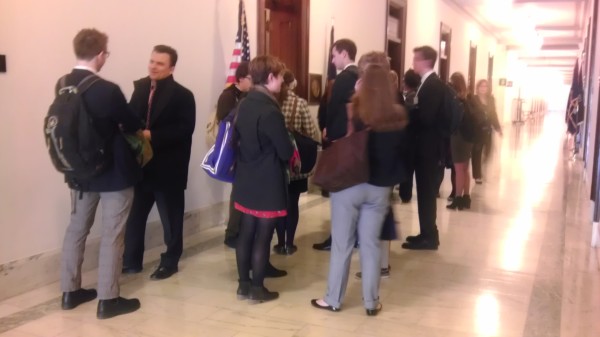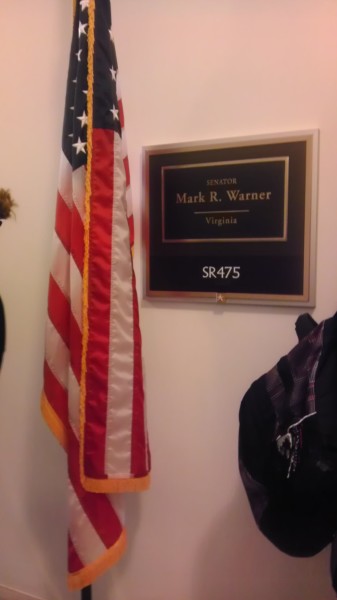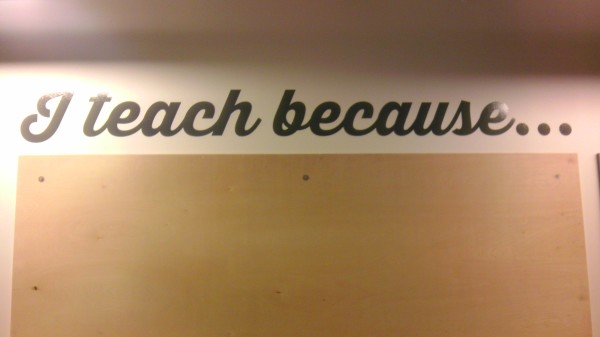Day 7 of 10: It’s Everyone’s Problem
Friday, January 9, 2015
Today was jam packed with site visits to the US Senate, Teach For America (TFA) who catered Cosi for us, and Civic Enterprises.
Walking out of Union Station, we huddled together at the light post like ducklings waiting on the signal to go-ahead. A few of the students played double dutch with traffic and crossed into no-man’s land after looking both ways to confirm the coast was clear. Regardless, the big challenge was which door to enter through. Dan snapped a quick photo for the page while we deliberated between the two doors and Tess attempted to contact our inside man/woman. Finally we chose the door closest to us and proceeded through a TSA style security checkpoint. Behold the United States Senate.
A marble staircase spiraled into the sky and vacant hallways resounded of grandeur. Step by increasingly labored step we made our way to the top. You haven’t truly felt the stairmaster burn until you’ve walked up marble stairs. I’m going to be so fit by the end of this trip. We arrived outside of Senator Warner’s office while our point of contact searched the labyrinth of halls to find us. An aide noticed we were not the usual bunch of policymakers he’d grown accustomed to seeing and inquired about our purpose. The smart lad skipped the stairs and disappeared down the elevator on a quest to reunite us with our insider. In the meantime, Marvin (legislative correspondent on education) and his assistant, Lauren, escorted us to a conference room and we, too, disappeared behind the grandeur like grass in the fog.
Within these walls we asked them our tried and true question about the end goal of education. The reply was to “allow people to explore the full depths of their potential. We can’t guarantee success but there should be the opportunity” for it. Marvin spoke of two movements in education: the school as a great equalizer and school as an isolated product of the community. Coming from the top of the education spectrum, I found it interesting that he believed we, as a nation, need to “move away from this culture of self-bigotry.” Upper level officials need to be aware of the student experience so that they can build upon a foundation of understanding rather than starting from scratch and only knowing what information they skimmed from a briefing. Calling for legislative accountability, due to the influence of such elite positions, Marvin alluded it’s the responsibility of legislators to personally acquaint themselves with the topics their legislation affects. Acknowledging the rift between policymakers and practitioners, Marvin proposed a way to deal with the inevitable tension—open conversation. “You shouldn’t use your experience as universal.”
He raised the crisis of student debt in this country and the negative consequences on both the student and the nation. For example, a lot of educated people cannot take chances in entrepreneurship, life, etc. because of college debt which cripples mobility financially, physically, and mentally. Personally, I get stressed out when I borrow $20 from my mom and payday isn’t until next week. Imagine graduating from college with an IOU of upwards $50k and you still haven’t heard back from those employers you applied to. You listened to society, graduated from high school, went on to college, majored in something other than basket weaving, and, upon receiving that degree, learned your efforts weren’t quite good enough. While you were split between studies and extra-curriculars, you were supposed to increase your stress by another level through internships and volunteer work. Nevermind the fact you need real money to pay rent for a roof over your head and groceries. You were a student who dared to leave the comfort zone of home and go where quality education may require scholarships and loans. Society told you this is what you needed to be successful, and now you’re right back at home, struggling paycheck-to-paycheck all the while someone calls you on a monthly basis to remind you that you’re poor, severely in debt, but educated. This is the student debt crisis.
To quote one of my favorites from Teach For America, “When we say ‘it gets better’ it [needs to not be] just a catch phrase, but a reality.” Education reform extends so far beyond race that to view it in such a black and white lens is to neglect the special needs student whose teachers lack the proper training to handle their condition and learning style, the LGBTQ kids who grow up in the midst of “no-promo-homo” laws, the increasingly educated poor, and many more students who haven’t reached their fullest potential and received the attention they deserve because America can’t see beyond skin color. Higher achieving schools tend to think “where” when it comes to college, but “if” represents a significant chunk of the population. Even if teachers bridged the gap between students and communities through listening, home visits, and aligning with key stakeholders in the community as TFA does, “what gets measured, gets done” and only the good stats get measured. Too bad, so sad is not acceptable from our policymakers, our institutions, and our people. It’s everyone’s problem.
Enter Jen from Civic Enterprises with social/emotional learning (SEL) which leads to 11 point gains in education. SEL includes self-awareness, self-management, and interpersonal skills by providing scenarios and alternative ways to respond for both the teacher and students. “You’ve got to build skills and develop kids.” For example, suspension tells kids that education isn’t valuable. Instead we need to account for bigger issues, trends, and influencing factors when it comes to discipline. America isn’t as dumb as statistics would have you believe. “If you look at any school with under 25% poverty, they’re outperforming overseas countries.” However, countries obsessed with test scores eliminate creativity and place excessive stress on students and teachers. “It’s not about the grade you get, it’s about the fact you learned something. As a country we need to rethink why we send kids to school.” If a kid isn’t succeeding, it’s everyone’s problem not just the school’s and not just the teacher’s. Rather than shutting down a poor performing school, one should look deeper into the issue to see what may be affecting their success. Is it an issue of “white flight” or “apartheid schools” like in Missouri and can closing the school cause more harm than good? Thus, fueling the fire instead of extinguishing it.
In response to the end goal of education, Jen presented this: [Education should be] “This experience where kids can grow and develop knowledge, where learning is fun and enjoyable. The point of education shouldn’t be a means to an end of making money, because you’ll miss it if so.”
~ Lynelle Haugabrook







No comments.
Comments are currently closed. Comments are closed on all posts older than one year, and for those in our archive.